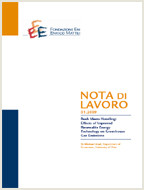Strategic Network Interdiction

22.05.2011
Sunghoon Hong
C72, D85, H56
Network Interdiction, Noncooperative Game of Flow, Nash Equilibrium, Power Law, Kalai-Zemel Game of Flow
Climate Change and Sustainable Development
Carlo Carraro
We develop a strategic model of network interdiction in a non-cooperative game of flow. An adversary, endowed with a bounded quantity of bads, chooses a flow specifying a plan for carrying bads through a network from a base to a target. Simultaneously, an agency chooses a blockage specifying a plan for blocking the transport of bads through arcs in the network. The bads carried to the target cause a target loss while the blocked arcs cause a network loss. The adversary earns and the agency loses from both target loss and network loss. The adversary incurs the expense of carrying bads. In this model we study Nash equilibria and find a power law relation between the probability and the extent of the target loss. Our model contributes to the literature of game theory by introducing non-cooperative behavior into a Kalai-Zemel (cooperative) game of flow. Our research also advances models and results on network interdiction.
